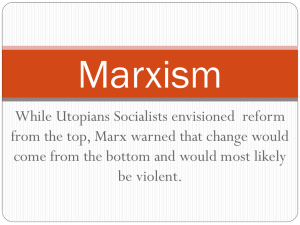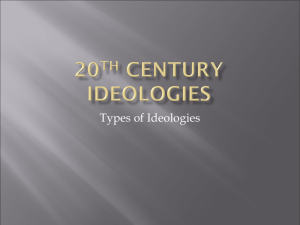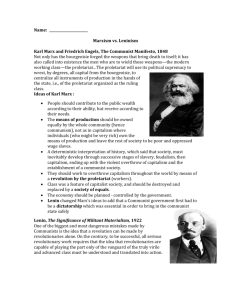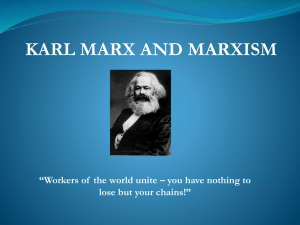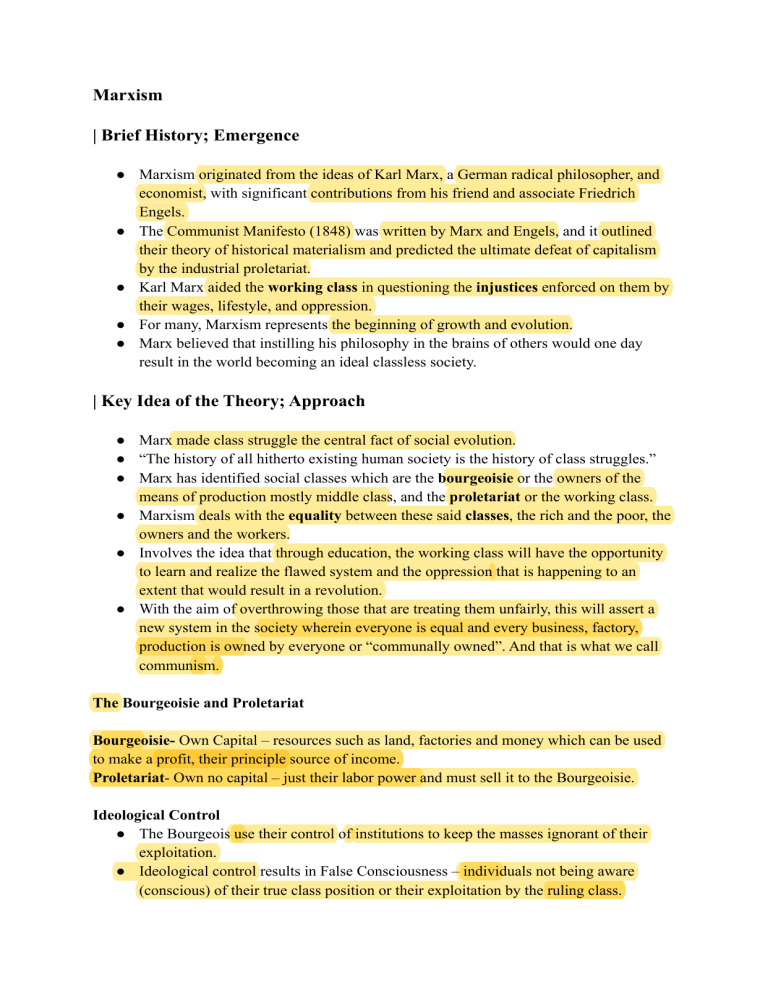
Marxism | Brief History; Emergence ● Marxism originated from the ideas of Karl Marx, a German radical philosopher, and economist, with significant contributions from his friend and associate Friedrich Engels. ● The Communist Manifesto (1848) was written by Marx and Engels, and it outlined their theory of historical materialism and predicted the ultimate defeat of capitalism by the industrial proletariat. ● Karl Marx aided the working class in questioning the injustices enforced on them by their wages, lifestyle, and oppression. ● For many, Marxism represents the beginning of growth and evolution. ● Marx believed that instilling his philosophy in the brains of others would one day result in the world becoming an ideal classless society. | Key Idea of the Theory; Approach ● Marx made class struggle the central fact of social evolution. ● “The history of all hitherto existing human society is the history of class struggles.” ● Marx has identified social classes which are the bourgeoisie or the owners of the means of production mostly middle class, and the proletariat or the working class. ● Marxism deals with the equality between these said classes, the rich and the poor, the owners and the workers. ● Involves the idea that through education, the working class will have the opportunity to learn and realize the flawed system and the oppression that is happening to an extent that would result in a revolution. ● With the aim of overthrowing those that are treating them unfairly, this will assert a new system in the society wherein everyone is equal and every business, factory, production is owned by everyone or “communally owned”. And that is what we call communism. The Bourgeoisie and Proletariat Bourgeoisie- Own Capital – resources such as land, factories and money which can be used to make a profit, their principle source of income. Proletariat- Own no capital – just their labor power and must sell it to the Bourgeoisie. Ideological Control ● The Bourgeois use their control of institutions to keep the masses ignorant of their exploitation. ● Ideological control results in False Consciousness – individuals not being aware (conscious) of their true class position or their exploitation by the ruling class. Capitalism causes alienation ● Under Capitalism the worker becomes alienated from the process of production, from the people he works with and from the products they produce. This is because he lacks control over his work and becomes a ‘machine’, and thus work appears as ‘alien’ to him. ● Marx argued that Capitalism had within it the seeds of its own destruction – it would eventually create the social conditions that would lead to its downfall. In order to stay competitive, Capitalists would have to sell goods at lower prices, which would mean reduced profit. Revolution and Communism ● Marx argued that following the overthrow of the Bourgeois – society would eventually organize itself along Communist lines – where the means of production are collectively owned (no private property) and everyone has equal wealth. The point of ‘Social Research' ● Marrx thus theorized that Capitalism would gradually lead to an increasing amount human misery and exploitation and that it must, one day come to an end. ● As far as Marx was concerned, he had realized the truth, and he believed that political action was necessary to ‘wake up’ the proletariat and bring them to revolutionary class consciousness. | Strengths ● It successfully highlights unfairness- It helps in exposing injustices in the society such as the uneven distribution of income and power as it passionately believes that all people should be treated with equality and dignity, as well as everyone should share in the wealth of the community, not just the owners of the means of production, but also the working class. ● It creates a system of equality among the members of the society- Marxism benefits society in a way that it promotes the establishment of a classless society. The idea proposes that, as opposed to private ownership, the means of production, distribution, and exchange should be owned by the entire community as a whole. ● It reduces debt as people will be cooperatively striving to build their communityAs societies cooperatively work together to build their society, Marxism predicts a trend for debt levels to decline. While the government assists by allocating the necessary resources, people would take care and provide for each other. ● Offers protection to the unions in order to advocate for individual rightsMarxism encourages unions to defend the individual rights of humans and to prevent the exploitation and unfairness that is being done by the management that owns the means of production in order to maximize labor. ● It draws attention to the socioeconomic distinction between people who own productive resources and others who sell their labor- Marxism draws attention to the injustice of the owners of the means of production exploiting common laborers. This revelation sparked the formation of trade unions and protective employment laws that continue to have an impact today. For example, in the Philippines, there is a law indicating that the legal working day for any person employed by another shall be of not more than eight hours daily as according to Section 1 of the Commonwealth Act No. 444 | Weaknesses ● It tries to abolish religion- Religion goes against the equality principle of marxism thus, you can have the freedom to believe in your own faith but you cannot practice it. ● It negatively affects the educational system- Methodology of teaching, curriculum construction and examination system would be determined by the state and it does not allow other agencies in education—local or regional—to have their say. This can lead into state, manipulating and brainwashing students, teaching them substandard information, and neglecting them. ● It does not value the concept of private ownership- One does not have control over their residencies and contributions since no one will be given private property ownership. This makes it impossible and hard to take business advantage of someone else because they can't give them any reward for working. ● It limits opportunities for entrepreneurs- Businesses under marxism means working for the government. You cannot be an entrepreneur since everything would be run by the government. ● It can lead to communism- Marxism can lead to dictatorship because it would not allow anyone to be an individual, which can lead to a dangerous society, with no one being motivated. | Impact on the Study of Society ● Marx's social theories connected the flaws of capitalism with a growing class conflict between the working labor and business owners, ultimately leading to a revolution that would empower the working class and create communal ownership of the means of production. ● Marx argues that there are inequalities in society based on social class differences. ● Marx claims that to improve society and make it fairer there needs to be large-scale change. ● Marxism is criticized for ignoring other important factors such as gender and ethnicity, focusing too much on social class. ● Marx’s political-economic, materialist, and dialectical thought continues to inform research programs in sociology. ● Control of productive resources is a source of social power in capitalist society, shaping the conditions of work, discourse in the mass media, and state policies worldwide. ● These relationships have grown in scope since Marx’s day, as have attempts by antisystemic movements to find local autonomy, cross-national cooperation, and solutions to ecological crises. ● With capitalist society and how to study it as its central subject matter, Marx’s work remains a source of insight for all sociologists interested in studying the origins, the structure, and the nature of the change within the capitalist system. Report by: Grade 11-HUMSS Fitz Reynald Bacolod Eljohn Samper Samantha Mae Bas Nicole Faye Gonzales Joelle Carla Rejuso

